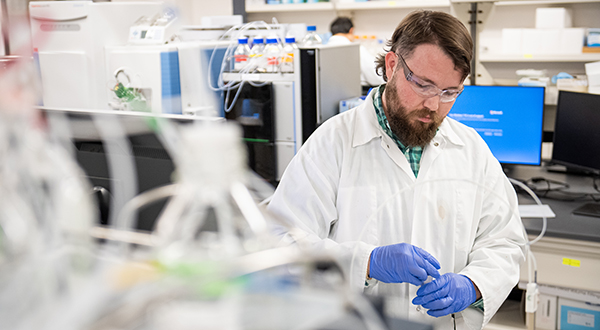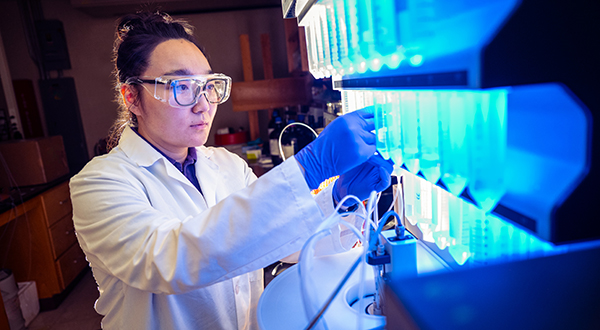K-State advances biomanufacturing research through interdisciplinary hires
Newly hired professors at K-State are establishing significant new research labs as the university builds its research enterprise in the expansive area of biomanufacturing.
By Rafael Garcia
K-State News and Communications Services
Monday, Dec. 16, 2024
MANHATTAN — The complexity of today’s interconnected world demands innovative, cross-disciplinary solutions. Through its Multidisciplinary Hiring Initiative in Biomanufacturing, Kansas State University is building transformative research capacity to address global challenges.
Beginning in late 2023, the initiative seeks academic and industry leaders who will elevate cutting-edge work in biomanufacturing. Faculty are hired into home departments but collaborate across various campus units, reflecting the cross-disciplinary approach needed to tackle complex problems such as Lyme disease immunity, vaccine development and antimicrobial resistance.
So far, three faculty members have started at K-State, with a fourth joining in January 2025. Through the overall Biomanufacturing Training and Education Initiative, they are leading research that also trains and prepares students to meet the demand for a well-equipped and skilled biomanufacturing workforce.
Collectively, they represent K-State's commitment to expanding research, enhancing instructional capabilities, building industry partnerships and contributing to Kansas’s economic development.
"The establishment of the Biomanufacturing Training and Education Initiative marks a transformative step toward equipping the next generation of innovators with the skills and knowledge needed to drive advancements in sustainable biotechnology," said Beth Montelone, senior associate vice president for research who has led the initiative. "By bridging education and industry, this initiative ensures a workforce ready to meet the challenges of tomorrow while fostering economic growth and global health."
Brandon Garcia: Unraveling bacterial immune evasion
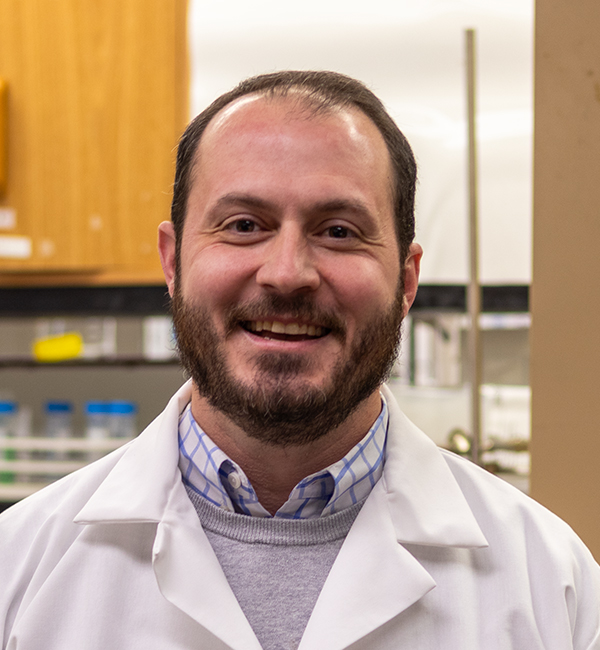
With a broad set of skills and expertise across several biological disciplines, Brandon Garcia, associate professor of biochemistry and biophysics, leads a team of student researchers and trainees exploring the molecular structures of proteins involved in human diseases.
His team focuses on understanding how Borrellia burgdorferi — a tick-borne bacteria that causes Lyme disease — survives in humans with otherwise fully-functioning immune systems.
Nearly half a million people are infected with B. burgdorferi every year in the U.S., according to the Centers for Disease Control and Prevention, with the number and geographic range of infections continually increasing.
His lab has recently identified several specific proteins that this bacteria produces which can turn off key components of humans' innate immune systems. Current research aims to understand how these proteins’ unique shapes allow them to recognize and evade immune pathways that would otherwise quickly destroy them.
That work may ultimately lead to more effective diagnostics and treatments for human diseases caused by vector-borne pathogens, Garcia said. Several key insights have already come from studying and learning about B. burgdorferi.
"Bacteria have evolved amazing and unique ways to potently stop the human immune system in its tracks," Garcia said. "Understanding how this works at the molecular level may also provide new ideas on how to develop drugs capable of treating many different types of human autoimmune and inflammatory diseases."
Garcia earned his doctorate in cell biology and biophysics from the University of Missouri — Kansas City. Before joining K-State in August 2024, he was an assistant professor at the Brody School of Medicine at East Carolina University, where he researched human diseases caused by infectious agents and diseases associated with immune system dysfunction.
Lihua Wang: Developing vaccines and therapeutic antibodies
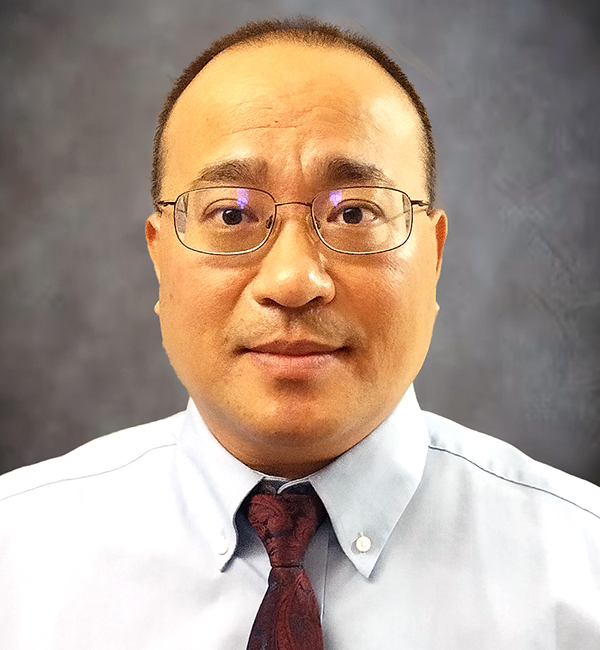
Lihua Wang, assistant professor of virology and vaccine immunology, brings more than two decades of experience developing diagnostic tools and vaccines for high-impact animal diseases, including Ebola, rabies, dengue fever, Japanese encephalitis, African Swine Fever, classical swine fever, and porcine reproductive and various swine diseases.
At K-State, Wang continues to develop vaccines and host-derived therapeutic antibodies for infectious diseases and antimicrobial resistance. His work includes the development of products such as recombinant protein-based subunit vaccines, therapeutic monoclonal antibodies, recombinant viruses, and live attenuated viruses.
These products are critical to fighting the continually evolving global threats of infectious diseases and increasing antimicrobial resistance.
"My research at K-State aims to address these challenges by developing innovative solutions, including vaccines, diagnostics, and host-derived therapeutic monoclonal antibodies," Wang said. "By harnessing advanced technologies like mRNA, single B cell antibody discovery, and viral vector-based delivery, we strive to combat high-impact infectious diseases such as African swine fever, classical swine fever, rabies, canine distemper, and feline infectious peritonitis, as well as the growing issue of antimicrobial resistance."
Wang holds a doctoral degree in pathogen biology from the Chinese Center for Disease Control and Prevention. where he also served an associate professor who led a team of experts supporting surveillance, detection and medical care of Ebola cases in Sierra Leone during the 2014-2015 Ebola outbreak in West Africa.
He previously held postdoctoral positions at the Medical College of Wisconsin and the University of Alabama – Birmingham.
Wang was previously an associate scientist and research assistant professor at K-State prior to his August 2024 appointment through the Biomanufacturing Cluster Hire initiative.
Jikai Zhao: Converting agricultural waste into valuable bioproducts
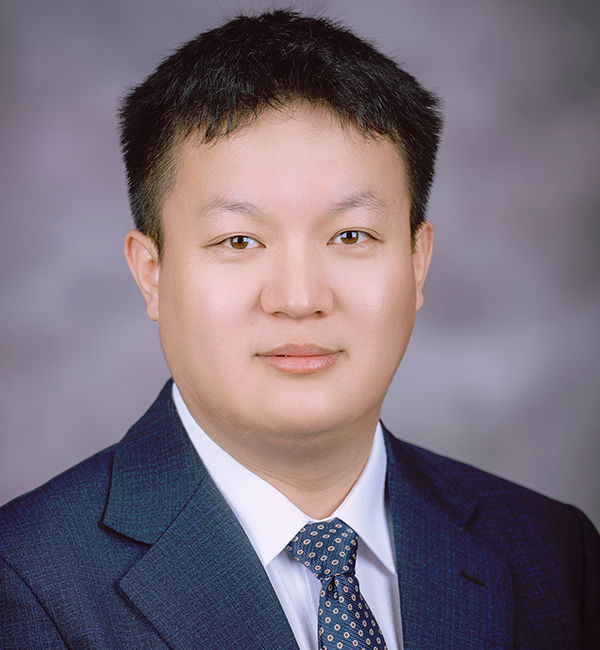
Jikai Zhao, assistant professor in the Carl and Melinda Helwig Department of Biological and Agricultural Engineering, focuses on transforming agricultural waste into valuable bioproducts, such as biofuels, platform chemicals and low-calorie sweeteners.
He also conducts techno-economic analysis and life-cycle assessment to determine the economic viability and environmental impact of the processes.
Since he arrived at K-State in August 2024, Zhao has been advancing K-State's biomanufacturing initiative by combining his expertise in engineering microbial engineering and biorefinery development to address industry challenges.
By optimizing microbial production systems and improving bioprocess efficiency, Zhao aims to reduce fossil fuel dependence, lower carbon emissions and develop renewable alternatives for the food and chemical industries.
"One major challenge is developing more sustainable methods for producing bio-based materials and chemicals, reducing reliance on traditional petroleum-based processes," Zhao said. " By using advanced pretreatment and biological systems to efficiently convert agricultural and food waste into biofuels, platform chemicals, and low-calorie sweeteners, we can help reduce dependence on non-renewable resources, generate new revenue streams, and support a more sustainable bioeconomy."
A 2022 K-State doctoral graduate in biological and agricultural engineering, Zhao previously worked as an assistant professor at the University of Texas — Rio Grande Valley and a postdoctoral fellow at the University of Wisconsin — Madison.
Buddhapriya Chakrabarti: Bridging soft materials and biophysics
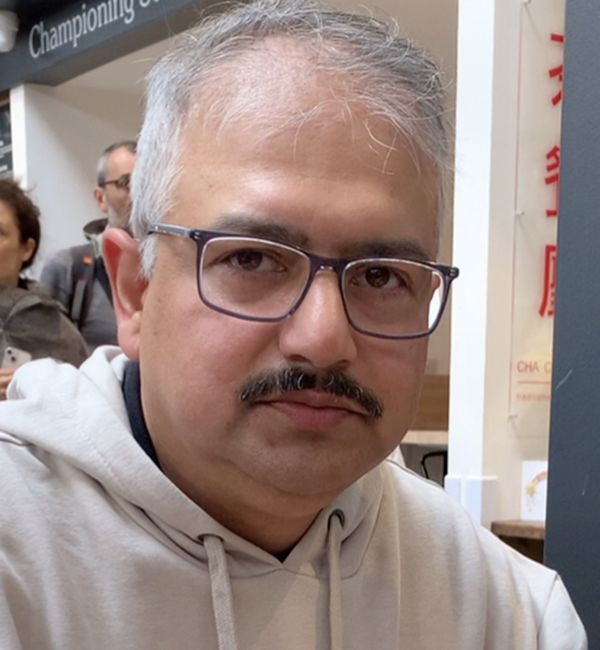
Buddhapriya Chakrabarti, incoming professor of physics, is a leading expert in soft materials and computational modeling, with a background of application-focused research in industrial challenges such as controlling surface migration of small molecules in complex formulations, predicting properties of confined soft matter, and modeling corrosion protection in polymerized coatings.
At K-State, Chakrabarti will lead investigations at the intersection of soft materials physics and biophysics, including biomaterials design, biomanufacturing and AI-driven development of biosimilars — alternative drugs that are manufactured differently but are otherwise clinically identical to their reference drugs.
Collaborating with academic and industry partners, his team will focus on and through K-State's Biosecurity Research Institute and the National Bio and Agro-Defense Facility, Chakrabarti's research will specifically develop clinical applications to address health challenges.
For example, Chakrabarti's research in bacterial cell wall mechanics could develop better strategies to combat antimicrobial resistance, particularly hospital-acquired infection like MRSA, in healthcare settings.
"By improving our understanding of these processes, our research may contribute to the development of targeted therapies for rare, life-threatening diseases, offering hope for improved treatment and quality of life," Chakrabarti said. "Beyond healthcare, the application of our soft matter research can impact industries such as coatings, pharmaceuticals, and hygiene products, offering innovative solutions to enhance product performance and sustainability."
Chakrabarti earned his doctorate in physics from the Indian Institute of Science, Bangalore. He has held postdoctoral positions at Harvard, the University of California-Los Angeles and the University of Massachusetts-Amherst, focusing on polymer science, biomathematics and soft matter physics.
He was most recently at the University of Sheffield in the United Kingdom, where he was an associate professor in the materials science and biological physics group.
Chakrabarti begins his appointment in January 2025.

